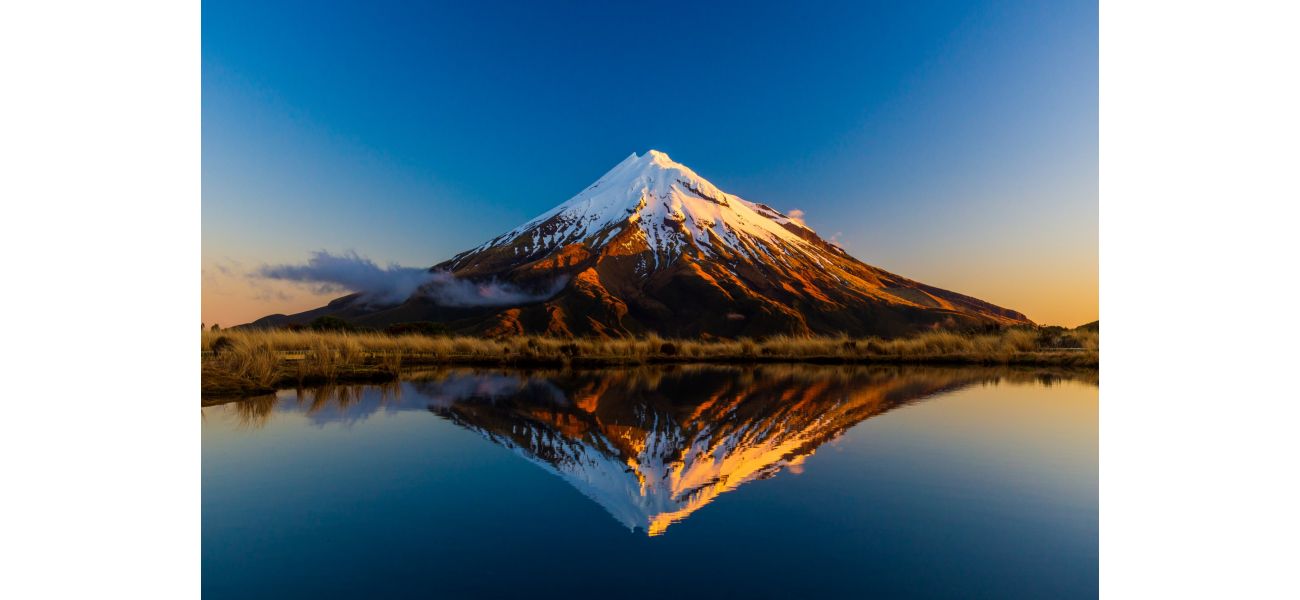A mountain in New Zealand now has the same legal rights as a person.
Mt Taranaki, a famous destination in New Zealand, is well-known for its hiking and tourism opportunities.
January 30th 2025.

In a groundbreaking move, the majestic mountain of Mount Taranaki in New Zealand has been granted the same legal rights as a person. This makes it the third natural feature in the country to receive this recognition, joining the ranks of Te Urewera, a native forest, and the Whanganui River.
Previously known as Mount Egerton, the mountain will now be referred to by its original Maori name, Taranaki Maunga. This change reflects the mountain's significance as an ancestral being to the indigenous people of the Taranaki region. Standing tall at 8,261ft, the snow-capped dormant volcano is a popular destination for tourists and outdoor enthusiasts alike.
The decision to grant the mountain legal personhood also includes the renaming of its highest peak to Taranaki Maunga. This acknowledgement of the mountain's true identity is part of a larger effort to rectify the injustices done to the Maori people during the colonization of New Zealand. It is a step towards fulfilling the government's commitment to redress the harm caused to the land and its inhabitants.
Under the new law, Taranaki Maunga is now considered a legal person with all the rights, powers, duties, responsibilities, and liabilities that come with it. Its legal personality has been given the name Te Kahui Tupua, which recognizes the mountain as a living and indivisible entity. This includes not just the physical aspects of the mountain, but also its spiritual and cultural significance to the Maori people.
Practically speaking, a public body has been created to represent the mountain, with four members appointed by local Maori tribes and four members appointed by the country's conservation minister. This co-governance model reflects the vision of the Treaty of Waitangi, where both iwi and the Crown work together for the wellbeing of the maunga.
According to lead negotiator Jamie Tuuta, this recognition of legal personhood aligns with the Maori worldview, where the mountain is seen as an ancestor rather than a mere resource. This decision marks the end of a long journey for the Maori people, as it acknowledges their deep connection to the land and their desire to protect it for future generations.
Debbie Ngarewa-Packer, a co-leader of the political party Te Pāti Māori and a descendant of the Taranaki tribes, expressed her joy at the decision, stating that it releases the mountain from the chains of injustice, ignorance, and hate. She also emphasized that this recognition does not change the strong connection that the Maori people have always had with the mountain.
The legal personhood of Taranaki Maunga is intended to ensure its health and wellbeing. It will be used to prevent forced sales, restore its traditional uses, and aid in conservation efforts to protect the native wildlife that calls the mountain home. Public access to the mountain will remain unchanged.
New Zealand has once again shown its progressive thinking by being the first country in the world to recognize natural features as people. This move not only acknowledges the cultural and spiritual significance of these natural wonders but also shifts the perspective from seeing them as resources to be exploited to living beings to be respected. With Te Urewera, the Whanganui River, and now Taranaki Maunga, New Zealand is setting an example for the rest of the world to follow.
Previously known as Mount Egerton, the mountain will now be referred to by its original Maori name, Taranaki Maunga. This change reflects the mountain's significance as an ancestral being to the indigenous people of the Taranaki region. Standing tall at 8,261ft, the snow-capped dormant volcano is a popular destination for tourists and outdoor enthusiasts alike.
The decision to grant the mountain legal personhood also includes the renaming of its highest peak to Taranaki Maunga. This acknowledgement of the mountain's true identity is part of a larger effort to rectify the injustices done to the Maori people during the colonization of New Zealand. It is a step towards fulfilling the government's commitment to redress the harm caused to the land and its inhabitants.
Under the new law, Taranaki Maunga is now considered a legal person with all the rights, powers, duties, responsibilities, and liabilities that come with it. Its legal personality has been given the name Te Kahui Tupua, which recognizes the mountain as a living and indivisible entity. This includes not just the physical aspects of the mountain, but also its spiritual and cultural significance to the Maori people.
Practically speaking, a public body has been created to represent the mountain, with four members appointed by local Maori tribes and four members appointed by the country's conservation minister. This co-governance model reflects the vision of the Treaty of Waitangi, where both iwi and the Crown work together for the wellbeing of the maunga.
According to lead negotiator Jamie Tuuta, this recognition of legal personhood aligns with the Maori worldview, where the mountain is seen as an ancestor rather than a mere resource. This decision marks the end of a long journey for the Maori people, as it acknowledges their deep connection to the land and their desire to protect it for future generations.
Debbie Ngarewa-Packer, a co-leader of the political party Te Pāti Māori and a descendant of the Taranaki tribes, expressed her joy at the decision, stating that it releases the mountain from the chains of injustice, ignorance, and hate. She also emphasized that this recognition does not change the strong connection that the Maori people have always had with the mountain.
The legal personhood of Taranaki Maunga is intended to ensure its health and wellbeing. It will be used to prevent forced sales, restore its traditional uses, and aid in conservation efforts to protect the native wildlife that calls the mountain home. Public access to the mountain will remain unchanged.
New Zealand has once again shown its progressive thinking by being the first country in the world to recognize natural features as people. This move not only acknowledges the cultural and spiritual significance of these natural wonders but also shifts the perspective from seeing them as resources to be exploited to living beings to be respected. With Te Urewera, the Whanganui River, and now Taranaki Maunga, New Zealand is setting an example for the rest of the world to follow.
[This article has been trending online recently and has been generated with AI. Your feed is customized.]
[Generative AI is experimental.]
0
0
Submit Comment





